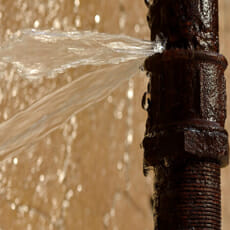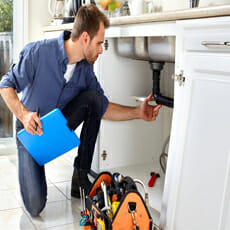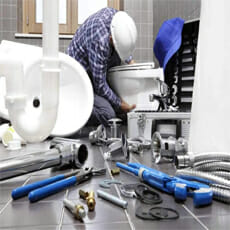Certainly! Homeowners insurance can cover a wide range of plumbing difficulties, depending on the details of your policy and the circumstances of the incident. In this article, we’ll go over the basics of homeowners insurance and plumbing concerns, such as what’s normally covered, and what isn’t, and how to navigate the claims process if you need to file one.
Let’s get started!
What Exactly is Home Insurance and What Does It Protect?
Homeowners insurance is a type of policy that protects your house and personal property from financial loss or damage caused by covered catastrophes such as fire, theft, or natural disasters. Homeowner’s insurance may also include liability coverage in the event that someone is hurt on your property or that you cause damage to someone else’s property.
5 Common Plumbing Issues Covered by Homeowners Insurance
Homeowner’s insurance coverage often covers plumbing problems that occur unexpectedly and cause damage to your home or personal items. Here are some of the most frequent plumbing issues that home insurance may cover:

2. Water damage: If your house sustains water damage as a result of a sudden and unforeseeable catastrophe, such as a burst pipe or a malfunctioning appliance, your homeowner’s insurance may cover the cost of repairs.
3. Sewer backups: If your house suffers a sewage backup as a result of a covered occurrence, such as excessive rain or flooding, your home’s insurance may pay for the cleanup and any associated damage.
4. Water heater leaks: If your water heater suddenly leaks and causes damage to your house or personal property, the cost of repairs may be covered by your homeowner’s insurance.
5. Damage from plumbing accidents: If a plumbing accident causes damage to your house or personal belongings, such as a contractor accidentally destroying your pipes during a renovation job, your homeowner’s insurance may cover the cost of repairs.
It’s crucial to remember that your policy’s specific coverage for these types of plumbing issues may differ based on your policy and the circumstances of the accident. For example, there may be coverage limitations or exclusions for specific types of damage. To understand the terms of your coverage, study your policy and speak with your insurance representative.
5 Plumbing Problems Not Covered by Home Insurance
While home insurance policies may cover certain plumbing problems, there are several forms of damage that are not normally covered by regular policies. Here are a couple of such examples:
1. Slow damage: Most homeowner insurance policies only cover damage that occurs suddenly and unexpectedly, not damage that occurs gradually due to wear and tear or neglect. This implies that if a leaky pipe stays unnoticed and causes damage over time, insurance may not pay for it.
2. Maintenance issues: Homeowners are responsible for maintaining their plumbing systems and avoiding problems that may have been prevented with proper maintenance. As a result, if a plumbing problem is caused by a lack of maintenance, insurance may not cover it.
3. Flood damage: Most homeowners’ insurance policies exclude coverage for flooding damage. If a flood causes a plumbing problem, it may not be covered unless the homeowner has acquired separate flood insurance.
4. Sewer line damage: Sewer line damage is frequently not covered by homeowners insurance because it is considered the homeowner’s obligation to maintain and repair their own sewer lines.
5. Non-residential plumbing: If a plumbing problem happens in a non-residential area of your property, such as a shed or attached garage, homeowners insurance may not cover it.
To completely understand what types of plumbing issues are covered and excluded by your coverage, study your policy and speak with your insurance representative. If you’re concerned about a specific type of plumbing problem, you might think about adding additional coverage or getting separate insurance to safeguard your house and personal items.
Do you need a reliable plumber to help resolve any plumbing problems not covered by insurance? Check these links below:
Step-By-Step Guide to File a Claim for a Plumbing Problem
If you have a plumbing problem that you believe is covered by your home’s insurance, the first thing you should do is study your policy.
To file a claim, complete these steps:

2. Call your insurance provider: Call your insurance company as soon as the plumbing problem develops. Prepare your policy number as well as a clear explanation of the event that produced the damage.
3. Collaborate with an adjuster: Your insurance company will almost certainly send an adjuster to inspect the damage and estimate the cost of repairs. Make sure to give any documents or evidence of the damage to the adjuster.

5. Perform essential repairs: Once your insurance provider confirms your claim, you can make necessary repairs to your home. Save all receipts and documents pertaining to the repairs for your records.
6. Contact your insurance company for clarity: If you have any questions or concerns about your claim or coverage, contact your insurance provider for clarification.
It is crucial to know that there may be coverage limits or exclusions for specific types of damage. To understand the terms of your coverage, study your policy and speak with your insurance representative.
How to Avoid Plumbing Issues and Save Money on Insurance?
While homeowners insurance can provide financial protection for unforeseen plumbing concerns, it is usually preferable to avoid these situations in the first place. Here are some pointers to help you avoid plumbing problems and save money on insurance:

2. Winterize your pipes: If you reside in a cold-weather area, insulate your pipes or leave a trickle of water running during extreme cold spells.
3. Understand what’s included: Understand your homeowner’s insurance policy and the types of plumbing issues that are covered. This can assist you in making educated judgments about how to avoid future difficulties and whether to pursue a claim if one occurs.
4. Consider increasing your deductible: Increasing your deductible on your homeowner’s insurance coverage will lower your premiums, but make sure you have adequate money to cover the deductible in the event of an emergency.
5. Search around for insurance: Comparing quotes from various insurance companies will help you discover the greatest coverage at the most economical price.
Also read: DIY Guide to Fix Common Plumbing Issues (Expert Tips)
Conclusion
To summarise, homeowners insurance can cover certain sorts of plumbing difficulties, such as fixing broken pipes and water damage, but it’s critical to understand the specifics of your policy and what is and isn’t covered. You can safeguard your house and save money on insurance rates by taking preventative measures and shopping around for insurance.
For any plumbing inquiries, contact Damien McEvoy Plumbing today at (02) 8599 4593.


 Enquire
Enquire